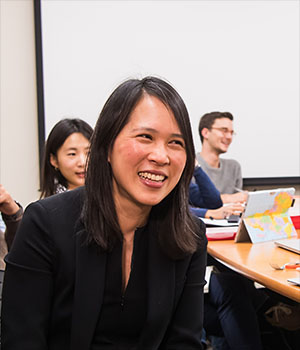
Lily Tsai
(she/her)
Political Science
Solidarity and resilience
A “wise and perceptive mentor,” Lily Tsai attends closely to her advisees’ wellbeing and intellectual growth, according to student nominators.
Lily Tsai is the Ford Professor of Political Science as well as the founder and faculty director of the MIT Governance Lab, a group of political scientists working collaboratively with practitioners on research and innovation in citizen engagement and government accountability. Her research focuses on issues of accountability, governance, and political participation in developing countries, with particular emphasis on Asia and East Africa. Her book, Accountability Without Democracy: Solidary Groups and Public Goods Provision in Rural China, received the 2007-08 Dogan Award from the Society of Comparative Research for the best book published in the field of comparative research. Tsai is also the 2015 recipient of the Levitan Prize, the highest research prize awarded by MIT’s School of Humanities, Arts, and Social Sciences.
Generous support
Exceptionally generous with her time, Lily Tsai is available for students whether it is the week or weekend, and even when she is on leave. While a student was abroad for fieldwork, Tsai spoke with the student almost every day. Notably, though, she explicitly does not set the same standard for her students. Writes one nominator, “she encourages us to take weekends off and to take vacations, and respects these times by not emailing or making demands on us.” Helping students cultivate a healthy work/life balance is a Mentoring Guidepost identified by the C2C program.
Tsai’s students are grateful for the copious ways she makes space to support their wellbeing. One nominator mentions that Tsai readily offers support, sponsorship, or collaboration on large-scale fieldwork efforts “even when the gain to [Tsai’s] professional agenda is unclear.”
When students are facing hardship, be it academic or personal, Tsai is a reliable support. One student mentions Tsai’s enduring encouragement as their dissertation proved harder to complete than anticipated: she “signaled that she believe[d] in me as a scholar—which is really important when facing self-doubts.” Another student recalls being invited to spend Christmas with Tsai and her family when in the midst of a distressing life shift.
Equitable community
Bolstering diversity in concrete ways matters to Tsai. She attends student/faculty meetings and brainstorming sessions exploring gender and diversity within the department, and serves on a diversity committee. Tsai talks openly with her students, providing “invaluable advice,” in the words of one student nominator, on navigating the balance between family, life, and work as a female academic. Most of all, nominators note Tsai’s emphasis on clear, actionable results around diversity.
For instance, she worked with students to identify “techniques for making sure everyone is heard and feels comfortable expressing their opinions in seminars and groups discussions,” according to a student nominator. Tsai admires scholars who are good at “talking to, understanding, and translating across a range of people from different families, cultures… communication styles” because they can “synthesize different streams of data and ideas.” She works to build these skills as part of a toolkit for her mentees. Such dedication to fostering a friendly and inclusive work environment is a Mentoring Guidepost identified by the C2C program.
Tsai operates in an experimental, iterative way. She recounts evidence that “interruptions during a talk can disproportionately disadvantage women” and her team’s resulting exploration of saving questions until the end of a talk. Tsai notes that such choices present complexity and raise dilemmas. If you shift the dynamics to make a group more equitable, what happens to group members when they are exposed to more traditional environments, such as when they are searching for jobs?
Exploring the dynamic tensions between flexibility and certainty bodes well for navigating a pandemic, in Tsai’s view. She notes, managing amid uncertainty is “hard because people naturally want structure and certainty— and that decreases with diversity. But as we’re finding… being able to live with and adjust to high levels of uncertainty can be a huge strength.”
